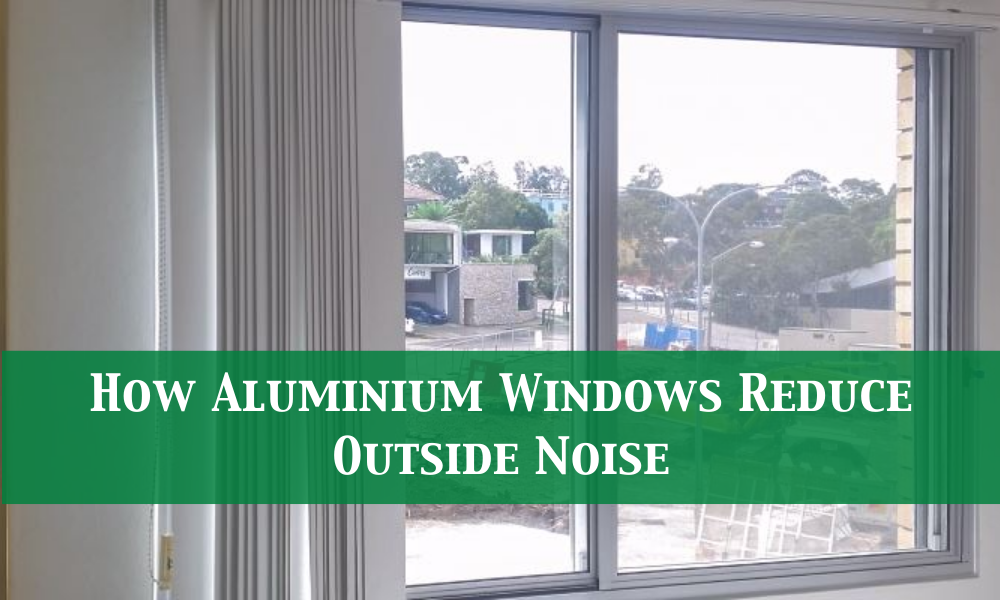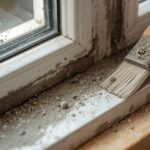In today’s bustling urban environment, finding tranquility within your home has become increasingly challenging. Furthermore, whether you’re dealing with traffic noise, construction site noise, or noisy neighbors, the quest for peaceful indoor spaces is real.
Fortunately, modern sound-resistant windows offer a practical solution that many homeowners are discovering. But do aluminium windows reduce outside noise effectively? The answer is a resounding yes, and here’s everything you need to know about creating your personal sanctuary.
Understanding How Noise Reduction Windows Actually Work
The science behind soundproof windows isn’t complicated, yet it’s incredibly effective. When sound waves hit your windows, several factors determine how much unwanted noise penetrates your living space. Unlike older single-pane windows that barely offer any acoustic insulation, modern aluminium window systems work through multiple mechanisms to create a sound barrier against unwanted sounds.
Sound insulation operates on the principle of mass, air gaps, and damping materials working together. The denser the material, the harder it becomes for sound waves to pass through. Additionally, when sound encounters multiple layers with air cavities between them, it loses energy at each transition point, resulting in significant noise reduction.
Furthermore, modern noise-proof windows typically feature double-glazing or triple-glazing configurations. These systems trap sound vibrations between glass layers, causing them to bounce around and lose energy before potentially reaching your interior space. Consequently, the result is a dramatic decrease in external noise levels that can improve your quality of life substantially.
The Power of Acoustic Glass in Modern Window Systems
When discussing soundproof windows, Dubai residents often ask about the glazing component that deserves special attention. Laminated glass stands out as the most effective option for sound attenuation, offering impressive acoustic performance ratings. This specialized glass contains a noise-dampening interlayer that specifically targets mid-to-high frequency sounds – exactly the type of noise that bothers us most.
Acoustic glazing comes in various configurations, each designed for specific noise challenges. For instance, asymmetric glass units use different thicknesses for each pane, preventing sound waves from easily resonating through the system. Meanwhile, laminated acoustic glass incorporates special interlayers that absorb sound energy rather than allowing it to pass through.
The glazing configuration you choose significantly impacts your windows’ sound insulation performance. Standard configurations might offer 30-35 dB of noise reduction, while premium acoustic glass units can achieve impressive ratings of 45-51 dB. To put this in perspective, a reduction of 10 dB represents a 50% decrease in perceived noise levels.
Why Aluminium Frames Excel at Sound Dampening
Many people wonder whether aluminium frames compromise acoustic insulation compared to other materials. Research consistently shows that aluminium actually outperforms many alternatives in noise resistance. The key lies in how these rigid frames are engineered and manufactured.
Modern aluminium window systems incorporate multi-chamber profiles that create additional barriers against sound transmission. These chambers don’t just improve thermal insulation – they also serve as effective acoustic barriers. Furthermore, the structural strength of aluminium allows for precise manufacturing tolerances, ensuring consistent sealing performance across the entire frame.
Thermal break technology represents another advancement that enhances both energy efficiency and sound insulation. By interrupting the pathway for vibrations, thermal breaks help prevent sound from traveling through the frame material itself. This technology is particularly important in high-performance window systems where every detail matters for optimal noise reduction.
The durability of aluminium frames also contributes to long-term acoustic performance. Unlike materials that may warp or deteriorate over time, aluminium maintains its structural integrity, ensuring that seals remain tight and sound insulation remains effective for decades.
Essential Components of Effective Soundproof Windows
Creating truly effective noise reduction windows requires attention to every component in the system. High-performance seals play a crucial role that’s often underestimated. These specialized gaskets, typically made from EPDM rubber, create an airtight barrier that prevents sound leakage around the window frame.
Professional installation cannot be overstated in its importance for acoustic insulation. Even the highest-quality soundproof windows will underperform if not properly installed. The window frame must be perfectly aligned, and all gaps must be sealed using appropriate acoustic sealants. Additionally, the surrounding wall construction needs proper treatment to prevent sound bridging around the window opening.
For homeowners exploring different window styles, both sliding windows and casement windows can achieve excellent sound insulation when properly designed. Casement windows often provide superior acoustic performance due to their compression sealing mechanism, while sliding window systems offer practical advantages in certain applications without significantly compromising noise reduction capabilities.
How to Isolate Noise from Windows: Advanced Techniques
When considering how to isolate noise from windows, several advanced strategies can maximize your results. Secondary glazing represents one option where an additional glass panel is installed inside your existing window, creating a larger air gap for enhanced sound dampening. This approach works particularly well in situations where complete window replacement isn’t feasible.
Window treatments can provide supplementary noise reduction. Heavy curtains with dense materials offer additional sound absorption, while specialized acoustic blinds can complement your windows’ built-in sound insulation. Thick fabrics designed specifically for sound absorption work best alongside properly designed noise reduction windows rather than as standalone solutions.
Moreover, for extreme noise environments, asymmetric glazing configurations use different glass thicknesses to prevent resonance effects. This approach can be particularly effective for specific frequency ranges that might otherwise penetrate standard double-glazing systems. When working with sliding windows, these advanced glazing techniques can be seamlessly integrated to enhance overall acoustic insulation.
Environmental Considerations and Noise Pollution
Understanding your specific noise environment helps determine the most appropriate soundproof windows for your situation. Traffic noise typically contains a broad spectrum of frequencies, requiring comprehensive acoustic insulation. Construction noise often includes low-frequency components that demand specialized treatment approaches.
Urban noise pollution affects millions of people worldwide, contributing to stress, sleep disturbances, and reduced quality of life. Effective noise reduction windows address these health concerns by creating genuine acoustic refuges within our homes and workplaces.
Different noise sources require different approaches. For instance, airport proximity demands windows capable of handling both high-intensity and low-frequency aircraft noise. Meanwhile, street-level commercial areas might need solutions focused on traffic noise and neighbourhood noise.
Additionally, industrial noise from nearby factories requires specialized soundproofing capabilities that can handle persistent, high-decibel sounds. When selecting casement windows for these challenging environments, the tight seals and robust construction become even more critical for optimal acoustic performance.
Measuring Sound Insulation Performance
When evaluating soundproof windows, understanding acoustic performance ratings helps make informed decisions. The Rw rating indicates overall sound insulation capability, with higher numbers representing better noise blocking ability. Premium acoustic windows typically achieve ratings between 40-52 dB.
Additional ratings like C and Ctr specify performance against different noise types. The C rating indicates effectiveness against higher-frequency sounds like voices and music, while Ctr measures performance against lower-frequency traffic noise. These specific ratings help match window performance to your particular noise challenges.
Furthermore, understanding decibel levels in your environment helps determine the appropriate level of sound insulation required. For example, busy highways generate 70-80 dB, while construction sites can reach 85-90 dB. Consequently, selecting windows with appropriate noise resistance ratings becomes crucial for effective acoustic insulation.
Installation and Maintenance for Optimal Performance
Proper installation techniques ensure your noise reduction windows perform as designed. The window frame must be properly supported and sealed, with special attention paid to the interface between the frame and surrounding construction. Professional installers understand these critical details that can make or break acoustic performance.
Sealing techniques play a particularly important role in maintaining soundproofing effectiveness. All gaps and cracks around the window frame must be sealed using appropriate sound-absorbing materials and insulating foams. This attention to detail can increase the soundproofing level by up to 15 dB.
Long-term maintenance plays a vital role in sustained sound insulation. Regular inspection of seals, hardware adjustment, and cleaning protocols all contribute to maintaining optimal noise reduction over time. Well-maintained aluminium windows can provide consistent acoustic performance for decades.
When maintaining casement windows, particular attention should be paid to the compression seals that create the airtight barrier essential for effective sound dampening. Regular lubrication of hinges and adjustment of sealing mechanisms ensures optimal performance throughout the window’s lifespan.
Cost-Benefit Analysis of Soundproof Windows
While noise-proof windows represent a significant investment, the benefits extend beyond simple noise reduction. Improved sleep quality, reduced stress levels, and enhanced property values all contribute to the overall value proposition. Additionally, modern sound insulation systems often include enhanced thermal performance, reducing energy costs over time.
When comparing options, consider the total lifecycle value rather than just initial costs. Premium acoustic glazing and frames may cost more initially but provide superior performance and longevity. Furthermore, the health benefits of reduced noise pollution exposure have quantifiable value that extends far beyond monetary considerations.
The productivity benefits in home offices cannot be understated either. Effective noise control through quality soundproof windows can significantly improve concentration and work efficiency. This is particularly relevant when considering sliding windows for home office spaces where both functionality and acoustic performance matter.
Advanced Soundproofing Technologies and Materials
Innovation in soundproof windows continues advancing, with new materials and manufacturing techniques regularly emerging. Smart glass technology now incorporates acoustic properties alongside traditional benefits like solar control and privacy features. These developments promise even better noise reduction performance in future window systems.
Advanced glazing technologies are also evolving, with new interlayer materials offering improved sound-dampening characteristics. Specialized acoustic glass incorporates sound-absorbing interlayers that target specific frequency ranges, providing customized solutions for different noise environments.
External roller shutters represent another advancement that can enhance the sound insulation of aluminium windows. Besides dampening outside sounds, they provide additional security and thermal insulation benefits. When combined with high-quality aluminium frames, these systems can achieve sound insulation ratings of up to 59 dB.
Real-World Applications and Case Studies
Residential applications demonstrate the practical benefits of effective noise-reducing windows. Homeowners near busy highways report 50-60% reductions in perceived noise levels after installing quality soundproof windows. These improvements translate directly to better sleep quality and reduced stress levels.
Commercial and urban settings present unique challenges that require specialized solutions. Office buildings near airports or construction zones benefit significantly from acoustic glazing and noise-absorbing treatments. The productivity benefits and improved working environment justify the investment in premium soundproofing solutions.
Industrial applications require even more robust noise control measures. Manufacturing facilities and workshops benefit from specialized window treatments that can handle both internal and external noise sources. The combination of structural strength and acoustic performance makes aluminium windows particularly suitable for these demanding environments.
Future Trends in Acoustic Window Technology
Manufacturing precision continues improving, enabling better sealing performance and more consistent acoustic insulation across production runs. Advanced sealing systems now incorporate multiple gasket layers and compression zones that virtually eliminate sound leakage.
Customization options are expanding, allowing for tailored designs that address specific noise challenges. Asymmetric configurations, variable glass thicknesses, and specialized interlayers can be combined to create optimal solutions for unique acoustic environments.
The integration of smart technology with acoustic performance represents an emerging trend. Windows that can adjust their sound insulation properties based on external noise levels or time of day are becoming increasingly feasible with advancing materials science.
Last Say!
Aluminium windows reduce outside noise effectively when properly designed, manufactured, and installed. The combination of advanced acoustic glazing, precise engineering, and quality installation creates genuinely effective sound barriers that transform living and working environments.
Whether you’re dealing with urban traffic noise, construction sounds, or other environmental disturbances, modern noise reduction windows offer practical solutions that deliver measurable results. By understanding the science behind sound insulation and working with experienced professionals, you can create the peaceful indoor environment you deserve.
The investment in quality soundproof windows pays dividends in improved quality of life, better sleep, reduced stress, and enhanced property value. In our increasingly noisy world, effective acoustic insulation isn’t just a luxury – it’s an essential component of healthy, comfortable living spaces that promote well-being and productivity for years to come.





